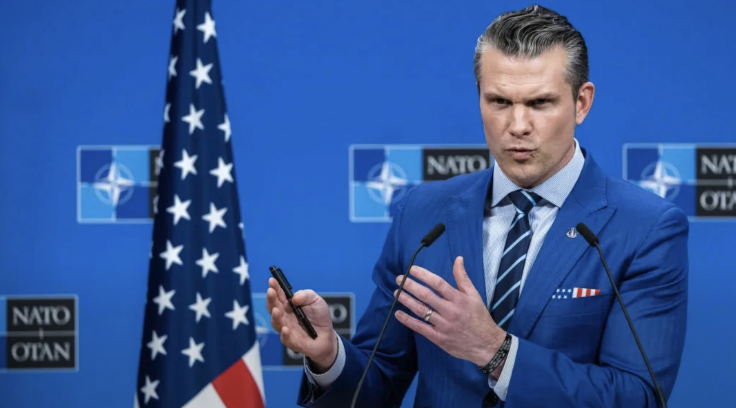Hegseth Blasts Media, ‘Disgruntled Former Employees’ Over Signal Controversy
Defense Secretary Pete Hegseth on Monday forcefully rejected a wave of media reports alleging mishandling of sensitive information, lashing out at what he described as “disgruntled former employees” and “anonymous smear campaigns” targeting his leadership at the Pentagon.
Speaking to reporters at the White House during the annual Easter Egg Roll, Hegseth defended himself against renewed claims that he had participated in a second Signal group chat where classified details regarding U.S. operations in Yemen were allegedly discussed. He insisted the reports were false and emphasized that he remains fully aligned with President Donald Trump on both defense policy and national security.
“What a big surprise that a few leakers get fired and suddenly a bunch of hit pieces come out from the same media that peddled the Russia hoax,” Hegseth said, responding directly to The New York Times report that reignited the controversy.
He continued, accusing the press of recycling old narratives fueled by unreliable sources.
“This is what the media does. They take anonymous sources from disgruntled former employees and try to slash and burn people’s reputations,” Hegseth said. “That won’t work with me. We’re reforming the Defense Department and putting the Pentagon back in the hands of warfighters. Anonymous smears from people who used to work here don’t matter.”
Hegseth, who appeared relaxed and upbeat alongside his family, added that he was “happy to be here at the Easter Egg Roll with my dad and my kids.”
When pressed by reporters on whether he had spoken with President Trump about the allegations, Hegseth confirmed he had.
“And we are going to continue fighting,” he said. “We’re on the same page all the way.”
White House Denies Report of Replacement Search
White House Press Secretary Karoline Leavitt swiftly pushed back on a separate report from NPR that claimed the administration had begun exploring replacements for Hegseth. NPR cited an unnamed U.S. official who was “not authorized to speak publicly” in asserting that the process to find a new defense secretary was underway.
Leavitt dismissed the report as baseless, calling it “fake news.”
“This @NPR story is total FAKE NEWS based on one anonymous source who clearly has no idea what they are talking about,” Leavitt wrote on X. “As the President said this morning, he stands strongly behind @SecDef.”
The White House’s official “Rapid Response” account echoed her comments, posting:
“Lies from NPR — which, as we all know, is a Fake News propaganda machine.”
Following Leavitt’s public statement, NPR revised its story to note the administration’s denial.
Background: Signal Chat Controversy
The dispute over Hegseth’s conduct stems from incidents earlier this year involving encrypted Signal group chats used by senior Trump administration officials. The controversy first erupted in April, when The New York Times reported that Hegseth had allegedly discussed operational details of a March strike against Iran-backed Houthi militants in Yemen in a Signal conversation that included his wife and brother.
The uproar intensified when The Atlantic’s editor-in-chief, Jeffrey Goldberg, was inadvertently added to a separate Signal chat among key national security officials planning another strike on the Houthis. Goldberg later published excerpts from that chat, drawing scrutiny from congressional Democrats and the media.
Trump Defends Hegseth
President Trump has repeatedly defended his defense secretary, describing the controversy as politically motivated and emphasizing that no classified information was compromised.
At a press conference last month, Trump dismissed Democratic calls for Hegseth’s resignation, saying the secretary had “nothing to do with this.”
“Hegseth is doing a great job,” Trump said. “He had nothing to do with this. How do you bring Hegseth into this?”
Trump also acknowledged that National Security Advisor Mike Waltz had accepted responsibility for mistakenly adding Goldberg to the Signal group.
“Mike Waltz … he claimed responsibility, I would imagine,” Trump said. “It had nothing to do with anyone else. It was Mike, I guess — that’s what I was told.”
The president downplayed any potential security risks associated with the incident, instead highlighting the success of the military operation.
“There was no harm done because the attack was unbelievably successful that night,” Trump said.
Conclusion
The controversy marks the latest chapter in the tense relationship between the Trump administration and major media outlets over issues of national security and transparency. Despite renewed scrutiny from The New York Times and NPR, both the White House and Defense Secretary Hegseth have presented a united front — insisting that the reports rely on misinformation and politically motivated leaks from disgruntled former staff.
With President Trump standing firmly behind him, Hegseth appears determined to weather the storm. As he put it on Monday, “We’re changing the Defense Department — and no amount of anonymous smears is going to stop that.”

